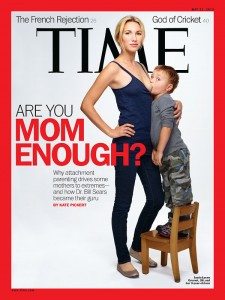Parenting Styles - Parenting Quiz
Three Misconceptions of Attachment Parenting
Tags: breast / bottle feeding, parenting styles, theory
 Time Magazine’s recent controversial cover has fueled mommy rants across the country. Even Saturday Night Live thought it was juicy enough to satirize.
Time Magazine’s recent controversial cover has fueled mommy rants across the country. Even Saturday Night Live thought it was juicy enough to satirize.
I’ve decided it’s time to put my own thoughts on the page once and for all.
American Pediatrician Dr. Sears created a brand called ‘attachment parenting’ which espouses such practices as co-sleeping, extended breastfeeding and carrying babes in slings in order to meet a child’s need to know they are loved and cared for.
I think every parent would want a good ‘attachment’ experience with their child. However, the exact process of how you attach and how fragile that attachment is, has lead me to observe some parenting practices that actually backfire and create more problems than they cure. Let me break that down into a few misconceptions the public harbour.
Misconception #1: Psychic Distress
Many parents believe that psychic distress is bad and will injure the attachment because they deduce that a child’s need is not being met, and that is supposedly an attachment parenting no-no. I disagree. In fact, certain psychic distress is exactly how we build mental strength and resiliency. Of course, everyone would agree that distress like living in a war-torn country, or witnessing or experiencing abuse is injurious, but having to walk instead of being carried in mommy’s sling is a different kind of stressor, isn’t it?
Just as the chick must peck its way out of the egg, using its muscles to strengthen its neck and lungs in preparation for life outside the egg, so too does a child need to struggle with disappointment, failure, loss and frustration. This is how one learns to trust oneself and to manage life’s ups and downs. It builds a positive self-concept of being capable.
Misconception #2: Needs Versus Wants
Does the 3 ½ year old on the cover of TIME Magazine ‘need’ to nurse or does he ‘want’ to? At 3 ½, if nursing was a need, the dietary challenges to the mother would be immense. Suckling for soothing is not the same as providing breast milk for its nutritional value. Of course, soothing a child is an important parenting role, but so is teaching self-soothing. It’s a skill to be learned. Being dependent on a mother’s nipple to soothe is time limiting even if we disagree on what the timing is.
Attachment parents seem to over estimate their youngsters’ needs and under estimate their wants. Children who always get what they want come to expect that this is their right. They learn to use tears and upset to get their way instead of more socially adept methods.
Deciding to start and stop breastfeeding is personal. I don’t want a mom to feel she needs to carry on breastfeeding because she believes if she doesn’t the child’s mental health is compromised. Every women should respect themselves enough to honour their inner voice and listen when those ‘NO’ feelings arise.
Misconception # 3: Kids First, Parents Last
Parenting is about training our children to be cooperative and to participate in the ‘give and take’ required of social living. No one should be unduly burdened or leaned on in the family. That is disrespectful.
Attachment parenting seems to focus solely on the child and not on the health of the entire family unit. Co-sleeping might be nice for a toddler, but if they kick, turn and disrupt the adult’s sleep, the needs of the parent to get proper sleep are being diminished. If we remind ourselves to go back to the simple notion of cooperation and ask if everyone is happy and feeling cooperative with one another, then you can’t go wrong. If five people want to tangle together to sleep and they are all happy and willing to do so then ENJOY! But sadly, in my experience of working with families, this is rarely the case.
Usually it’s mom sleeping with a baby or toddler while dad sleeps disgruntled and alone in a kiddie bed or on the couch. Too many times I have seen co-sleeping as an avoidance tactic, using the presence of kids to avoid facing the real issue: a dying sex life between mom and dad.
If you want an attachment family, don’t forget to attach with your partner. You will be doing a great service to your children if you model attachment by having a good strong marriage and a good sex life only improves matters. I say, “reclaim the matrimonial bed” and trust that kids will benefit from seeing two parents glowing in the morning. If you are a single mom/dad and are co-sleeping, ask yourself whose needs are really being met? Yours? Or theirs?
In Conclusion…
Lets raise children who are loved and cared for and who feel a sense of connection and belonging in their family life. Lets show them how to manage on their own and with others while teaching them life skills. Let’s pledge to set boundaries and reinforce them. Let’s treat ourselves with respect and dignity too. And finally, never do for a child something they can do for themselves…even if it’s a hassle right now, it will pay off in the future.



9 Responses to “Three Misconceptions of Attachment Parenting”
Kathy Buckworth
Alyson – such wise words and as always, counsel to be considered. Thanks for posting. Why are you so smart???:)
The Mommy Psychologist
As a child psychologist and a mom, one of the things that is so misleading about attachment parenting is the name. It is only called attachment parenting because of the theory it was based upon. It is not called this because it is the only form of parenting which allows parents to develop a secure attachment relationship with their children. There are numerous ways to develop a secure attachment relationship with our kids. I explore more of this myth here for anyone who is interested:
http://www.themommypsychologist.com/2012/04/15/what-does-the-mommy-psychologist-have-to-say-about-attachment-parenting/
Sarah
Alyson, you are so right! We need to abolish this ‘mommy guilt’. I won’t feel guilty for taking my baby out of her sling so she can learn to nap in her bed. I won’t feel guilty about needing a little exercise for myself or a night out with my husband. Attachment parenting seems to scare mothers into giving up on their own needs. This is not modeling a healthy lifestyle to children. They need to see their mothers as capable, confident individuals who know how to give themselves what they need as well as give to their children. I just read your book ‘Honey I wrecked the Kids’ after dealing with some emotional issues with my 5 year old adjusting to a new sibling. I learned that he is hurting and is discouraged and the new parenting practices I’ve employed are helping us both tremendously. A big thanks to you.
Alyson Schafer
Hey Kathy!
Thanks for chiming in. I think we have more in common with parenting than we let on eh? shhhhh….
Alyson Schafer
Hi there, Thanks for posting and joining in the conversation. Its a great discussion and I am glad people are sharing resources here too!
Have a great day. Off to read your blog and link!
Alyson
Kelly Adams
I’m glad to see the Time Magazine cover get an important conversation started in the parenting community. Thanks for the great read Alyson! Best tip: Let’s treat ourselves with respect and dignity too. 🙂
The Mommy Psychologist
Thanks, Alyson. Me too!
Gillian Edmonds
I think it would be useful to separate “Attachment Parenting” as intended (and as described by William Sears), from the types of parenting that lead to the misconceptions you have listed above. I think that many people simply guess what Attachment Parenting should look like…. apply it sloppily… and therefore end up focusing only on the child and not on the health of the whole family unit. The Attachment Parenting Book is subtitled :”A commonsense guide to understanding and nurturing your baby” and The Baby Sleep Book is subtitled: “The complete guide to a good night’s rest for the whole family”. These Attachment Parenting books have a wealth of great information on how to ensure you are building mental strength and resiliency, differentiating between needs and wants, and ensuring that the parents – and the whole family unit – are having their needs met. In my family practice, I routinely recommend William and Martha Sears’ books such as “The Discipline Book” and “The Successful Child” hand in hand with “Honey, I Wrecked the Kids” and “Ain’t Misbehaving”. The ideas of setting clear limits, being consistent, firm and friendly, and ensuring the needs of the whole family are being met are actually very similar.
Lisa Boulton
What an awful article! Shame on you for spreading such selfish and illogical thinking. My heart goes out to the poor children of the simpleton parents who believe your theories. I can say this with confidence that you won’t allow this post to be published – positive feedback only allowed!